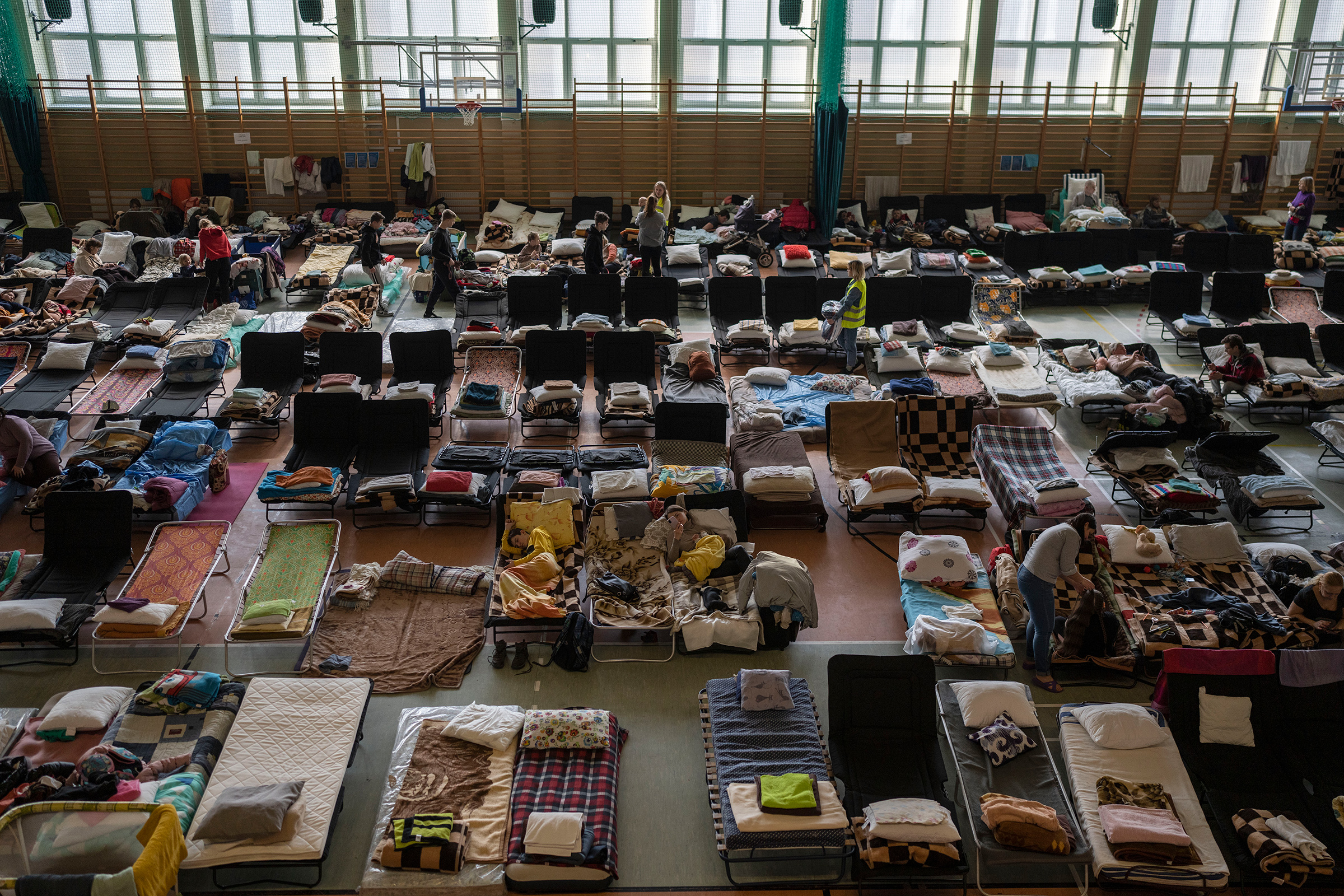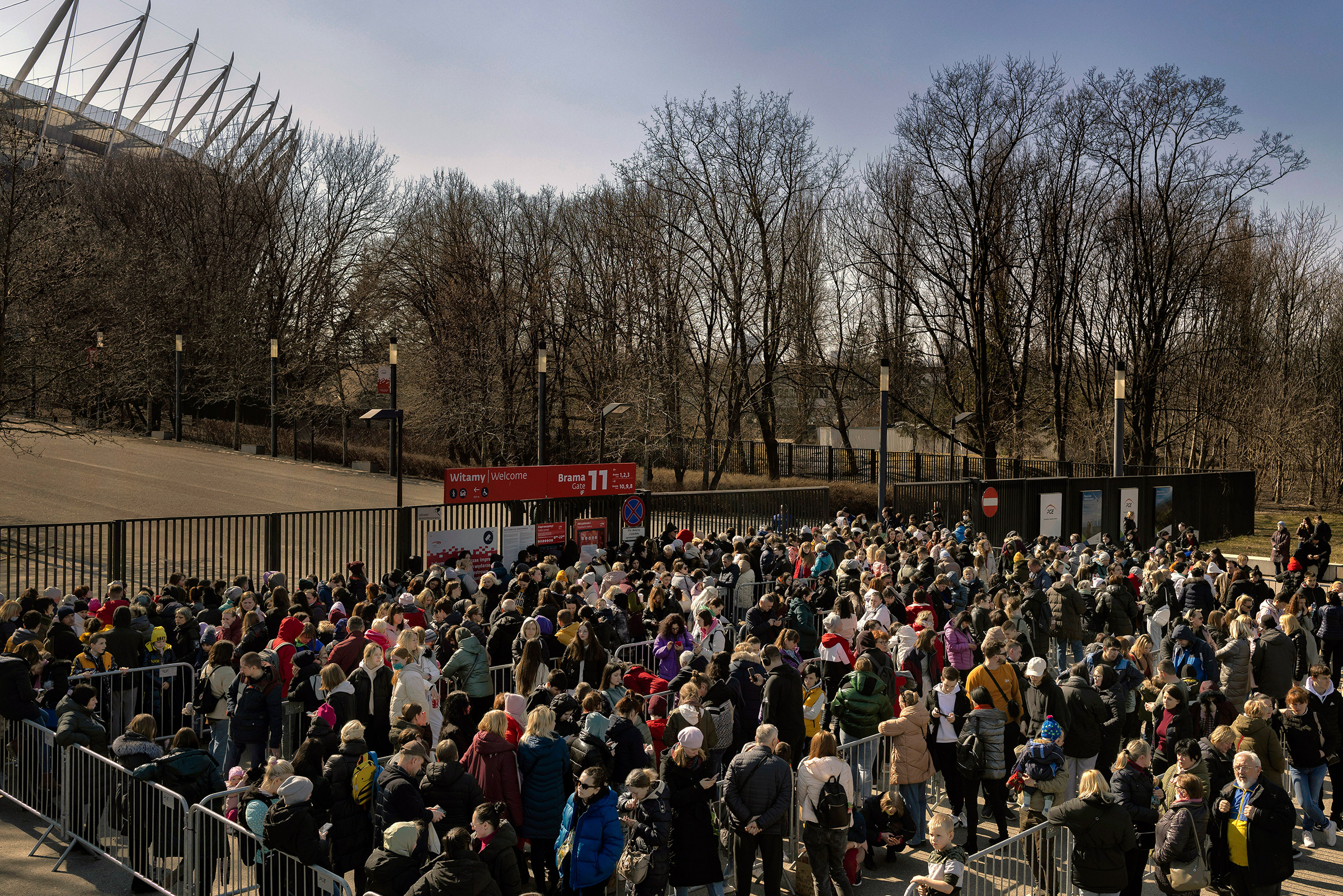Contrition is rare in politics, especially when it comes to the divisive issue of migration. So when a senior European Union official lamented on March 23 that the bloc’s response to the 2015 refugee crisis had been “a failure,” it appeared to mark a turning point in a region where attitudes towards refugees have grown increasingly hostile.
The catalyst for this soul-searching by the Home Affairs Commissioner, Ylva Johansson, was the arrival in the E.U. of more than 3.5 million Ukrainians. And on the surface, much has changed since Russia’s invasion of its neighbour on Feb. 24.
Amid an outpouring of goodwill across Europe for people fleeing the war, support has come from unexpected places. A populist Italian politician on trial for blocking migrant rescue ships has offered to bus Ukrainians to his country; a British newspaper that published an article calling refugees “cockroaches” ran an appeal for the war victims; Eastern European nations that refused to take part in E.U.-wide refugee relocation schemes are now bearing the greatest burden with apparent grace and generosity.
But while advocates for refugees hope that this new crisis will force the E.U. to overhaul its failing asylum system, and extend a warm welcome to other refugees, some also fear that a repeat of the mismanagement of 2015 will erode the goodwill and even worsen conditions for refugees everywhere.
“We have to be able to scale up dramatically to receive fellow Europeans in their hour of greatest need,” says Jan Egeland, a former U.N. diplomat who is now Secretary General of the Norwegian Refugee Council. “We have to work hard now for the generosity and the open door policy to sustain itself. It is a fight for the soul of Europe.”
He recalls early summer 2015, when #RefugeesWelcome became a slogan across the E.U. as more than 1 million people arrived in a movement sparked by the brutal civil war in Syria. But the positivity swiftly turned to hostility as the bloc’s chaotic mismanagement of the new arrivals was exploited by far right and populist forces. “To avoid the Refugees Welcome moment disappearing this time,” Egeland says, “there has to be governmental and public responsibility-sharing, complimented by volunteers.”


When Ukrainians began fleeing Russian aggression and crossing into E.U. nations like Poland, Romania, Hungary and Slovakia, the difference in treatment compared to refugees fleeing conflict in nations like Syria, Afghanistan, and Somalia was immediately clear.
Suggestions from some European commentators and politicians that Ukrainian refugees deserved greater empathy than people from the Middle East or Africa—including the Bulgarian President who said they were “intelligent… educated people” unlike other refugees who could be “terrorists”—provoked outcry, as did reports that people of color attempting to flee Ukraine faced racism and discrimination.
Read More: They Called Ukraine Home. But They Faced Violence and Racism When They Tried to Flee
The response of governments also differed. Just three months ago, Poland had been violently forcing men, women and children seeking asylum back over the border to Belarus, where people were freezing to death in the forests. Hungarian President Viktor Orban has referred to people seeking asylum as “poison” and a “terror risk.” Both nations have repeatedly blocked E.U. efforts to reform its refugee and asylum system, refusing to take part in any relocation schemes for refugees.
Now, they are on the front line: Poland is hosting 2.3 million Ukrainians; Hungary has 365,000. In response, the E.U. activated its Temporary Protection Directive (TPD) for the first time, which means that Ukrainians arriving in an E.U. nation have the right to live, work, attend school, and travel freely to any other E.U. country.

For Lina Vosyliūtė, a research fellow at the Centre for European Policy Studies, the move demonstrates awareness of the shortcomings of the “lengthy and degrading” E.U. asylum process. “It would have been impossible to process people via the current migration and asylum system, which would mean people being detained in hot spots or temporary locations until they get their asylum papers,” she explains.
It was the E.U.’s reluctance to activate the TPD in 2015 that prompted Ylva Johansson’s contrition. “It really was a failure of the European Union,” she told an event organized in Brussels by Politico Europe. “It has been my task to try and make migration an ordinary, boring E.U. policy area where sometimes we disagree [but] it’s not toxic, it’s not for drama queens…. Now I think we are dealing with it in a much better way than we did back [in 2015].”
But getting to the point where migration is detoxified, and much-needed reform can happen without rancorous political debate, depends on how well the E.U. manages the huge numbers of Ukrainians over the coming months.
“A lot can go well or go wrong,” says Camille le Coz, a senior policy analyst with Migration Policy Institute Europe. “Right now, there is a very high level of support for hosting refugees, but we have seen in the past how this could vanish quite quickly.”
Read More: ‘I Have No Other Choice.’ The Mothers Returning to Ukraine to Rescue Their Children
While the TPD grants Ukrainians many of the same rights as E.U. citizens for at least a year, there is little clarity on how nations will implement it. Which counties will host the Ukrainians? How will schools cope? What trauma support will they receive? Will governments assist them in entering the workplace and finding housing, and if so, how will they manage tensions with the local community?
Egeland worries that so far, there is little sign of an organized European response, with individual countries dealing with the new arrivals on an ad hoc basis and often relying on volunteers and civil society to bear the burden of care for them. “Improvization is not the best way to meet the largest challenge in European history since the Second World War.”
He is calling for a conference attended by the E.U., other affected European countries, and the U.N. to discuss a sharing of responsibility for hosting the Ukrainian refugees, and a plan for ongoing funding and support. But he stresses this must not be at the expense of assistance to other countries in crisis like Afghanistan, Yeman, and Syria.
“That is my fear: that it is going to be dramatically worse in other crisis areas because all eyes and increasing resources are turned to Europe,” he says.
Global mismanagement of the response to the Ukraine war could have even broader implications for the world’s refugees. As well as aid money being diverted, rising grain prices will compound already dire food shortages in much of the world, while a deterioration in relations between world powers means peace diplomacy could be paralyzed.
That means war in Ukraine may end up creating more refugees elsewhere, but Le Coz warns there will be less hope of them being resettled in richer nations: “There may be less political appetite for resettlement if Europeans say ‘We are already hosting millions of refugees from Ukraine, we cannot host other refugees from other parts of the world.’”
It is still early days in the crisis, however, and Europe’s politicians have the chance to learn the lessons from the past and live up to the optimism and goodwill shown by their citizens.
“I hope there is a reckoning,” says Egeland, “and also an understanding that we don’t become poorer as society by receiving refugees and people who need protection. We become richer.”
More Must-Reads from TIME
- Cybersecurity Experts Are Sounding the Alarm on DOGE
- Meet the 2025 Women of the Year
- The Harsh Truth About Disability Inclusion
- Why Do More Young Adults Have Cancer?
- Colman Domingo Leads With Radical Love
- How to Get Better at Doing Things Alone
- Michelle Zauner Stares Down the Darkness
Contact us at letters@time.com
